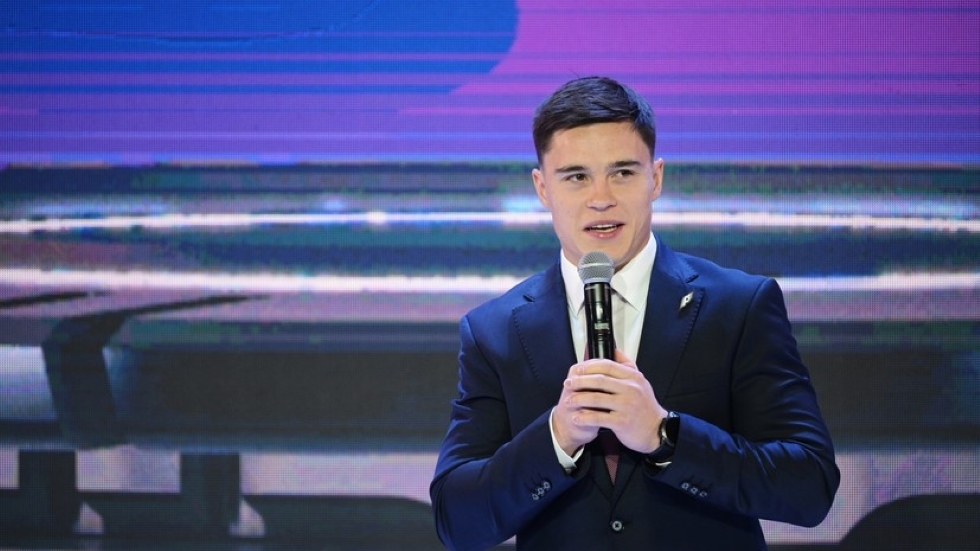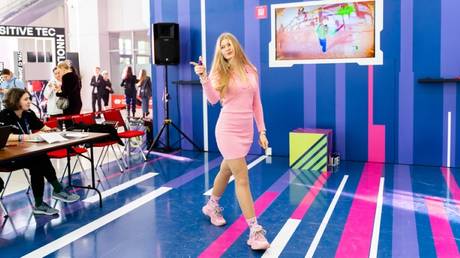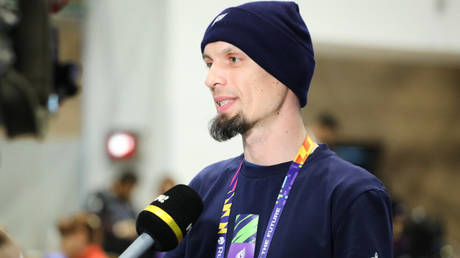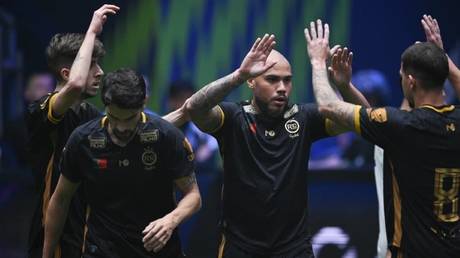
‘In some aspects, they were better than the Olympic’ – Olympic champ Nagorny on Games of the Future


The Games of the Future in Kazan exceeded even the highest of expectations, said Olympic champion Nikita Nagorny in an interview with RT. According to him, the competition generated a lot of hype and excitement, opening a new page in the history of international sports. The gymnast also admitted that he sometimes contemplates ending his career, even though he is still at peak performance, revealed whether he is prepared to compete at the Olympics again, and shared how his newborn son has become his number one source of motivation.
– It feels like you are involved in everything here in Kazan: you’re doing interviews, going to matches and socializing with the fans. Where do you get the energy to do all this?
– I do feel fatigued, but it’s a nice feeling. I guess it got a little easier after the opening ceremony. That was an impressive display, and a showcase of what we can do; it all went smoothly, and the organization was top-notch. Besides, competitions do have that energizing effect. As a professional athlete, I can say that a chance to take part in a tournament alone gives you enough motivation to train and prepare. And even though I’m part of the organizing team, I still get inspired by the atmosphere. The All-Russian Federation of Phygital Sports is happy with the results of all our teams, no matter if they won a trophy or not. Everyone did well. No one gave up even in the toughest of matches, they kept on fighting.
 Robot shows, dancing for everyone, and cyber prostheses trials: Why Games of the Future have become an important social project
Robot shows, dancing for everyone, and cyber prostheses trials: Why Games of the Future have become an important social project
– Was it difficult to be the head of the federation as the Games unfolded? There must have been many issues to deal with.
– This one’s easy to answer – I’ve got my team backing me up. It’s actually crucial to have the right people working alongside you. You need to know how to properly divide up and delegate the workload – then it gets much easier. Still, I do feel all that responsibility weighing down on me. Thankfully, the Games have been a success. The hype is insane. So much so that now people involved in sports that don’t have a phygital component want to create one. My task is to communicate with them, guide them and give them a chance to explore their potential.
– Did the Games of the Future exceed expectations?
– If we’re talking my personal expectations, it absolutely did. I don’t know about for the people who originally laid the foundations of the Games. After all, professionals involved in organizing such large-scale events tend to have extremely high standards for themselves. As for me, as a representative of the Federation, I am absolutely delighted. I am grateful to the people who made the Games happen – from the opening ceremony to all the spectacular competitions. Take the final game of the Phygital Basketball Championship, where the Russian Liga Pro Team defeated R10 Team USA. Even if we put the political component aside, the match captivated huge audiences.
I am also happy with the Games as an athlete. I’ve always believed that sports must have an element of spectacle to them. People are used to the idea that you can’t make regular sports competitions into a spectacular, eye-catching event. In Kazan, this was possible thanks to a combination of real and virtual sports. Other countries have their own ways of achieving that: they add concerts, half-time shows, etc... For a long time, we wanted to do something similar – and, in many ways, the Games of the Future are pioneer project, a showcase of that.
– Did you expect to see so many spectators? In some places there were literally no empty seats left.
– The number of fans that showed up was a pleasant surprise. I talk to a lot of people from different disciplines and I don’t remember ever having so many of them ask for tickets. A lot of my friends and acquaintances were asking for tickets, too. And we’re not just talking about the regular sports, but also new ones, like the Battle of Robots. The DOTA 2 tournament caused so much excitement, a real frenzy. A similar uproar for ice hockey. What’s more, a lot of people came to the arenas and stadiums without tickets, hoping to get inside one way or another. Many stood outside trying to get in. This happens at every international sporting event. Take the UFC, for example. I’ve been to their events many times, including in Abu Dhabi. I went to see Islam Makhachev fight. And let me tell you, it looked pretty much the same: thousands of fans would come to the arena without tickets hoping for a miracle. Some eventually even make it to the stands. Exactly the same thing is happening in Kazan. The demand is insane. And that’s a sign of a successful sporting event.
– Would you compare it to the Olympics?
– There’s no need to compare. The Games of the Future is a multi-sport tournament. Basically, it is sports imbued with technology, inasmuch as possible. In fact, Russia has done something that millions of people have been waiting for, for years now. It’s just that nobody wanted to make the first step. But we did it, and by doing it we’ve opened up new opportunities for athletes. In terms of organization and planning of the Games, in some aspects they were better than the Olympics. But, then again, we are talking about completely different formats. In Kazan, the competitions are at the level of teams, or clubs.
– Could you name two Games of the Future highlights that you will always remember?
– The first thing that comes to mind is the opening ceremony, of course. I happened to miss opening celebrations at all of the major international competitions I participated in. I even missed the opening of the 2020 Olympic Games in Tokyo. But here in Kazan I was actually quite impressed. Impressed by the scale and the event, by the fact that several heads of states came to see it. Most importantly, there was so much to discuss after the show. Like that one robot dog that got ‘tired’ and refused to do the tricks. As for the sports part, the main highlight is Liga Pro Team’s victory in a shootout in the final match of the ice hockey event.
 ‘The most important thing is to accept yourself’ – cybathlete Bachu on prosthetic hands and the Games of the Future in Kazan
‘The most important thing is to accept yourself’ – cybathlete Bachu on prosthetic hands and the Games of the Future in Kazan
– What other disciplines would you like to add to the Games?
– Our federation has a special ‘phygital lab’ – an expert group made up of Olympic champions, winners of major international competitions, esports athletes and public figures. For two or three years they have been working on ways to introduce phygital elements into all kinds of sports. We already have about 100 combinations. Naturally, we must meet the demand of those who wish to see more phygital sports. For example, not long ago, our team organized a phygital curling event in Krasnoyarsk. Why not take it to the federal level? As of today, we have eight complete disciplines, but the list will be expanded in the future.
– The Russian gymnastics championship will kick off on March 11, and you are going to take part in it. How do you balance your training for the competition with your work here at the Games?
– I’m not so good at balancing the two, unfortunately. I wanted to train, but the schedule here in Kazan is way too tight. Nevertheless, I understand very well that the Games of the Future is already part of the global history of sports. Right now, it is a part of my life. The is always going to be another national championship. No matter, I am still planning to go to Sochi and perform. It’s not a big deal, really: last two years, I came there in roughly the same shape, unable to train properly for the event.
– Your fellow gymnast from the Russian national team, Artur Dalaloyan, admitted in an interview with RT that he practices every day even during the off-season. Do you manage to train at all, given the crazy workload you’ve got?
– I’ve got more discipline when it comes to other things. I am only 27 years old. I am a young guy and I try to get good in a lot of things. Here in Kazan, I keep getting involved in all kinds of activities. I try to have a broader outlook, to have a hand at everything. Because ultimately, your experience is what matters. Because in the future, you never know where you’ll be able to apply it. Speaking of the upcoming gymnastics championship, I train in my room whenever I can. I even brought some special equipment with me. I do warm-up and some of the less complicated physical exercises. No matter what, I try to stay in shape. On March 2, I will fly to Sochi for the World Youth Festival. Phygital racing and one more event will be held there. Once that’s over with, I will focus entirely on the championship. I’ll still have ten days left to prepare.
– From the outside, it seems that you have plenty of different projects on your hands, but you feel at home dealing with matters outside of gymnastics. Have you thought about ending your career?
– I have, and I still think about it. On the other hand, like I said, I’m only 27. That’s peak age for a gymnast’s performance. Take the legendary all-around athletes like Alexei Nemov and Kohei Uchimura, for example. At age 27, they were in their prime. Believe me, until recently, I could not afford to train for a major competition for just two weeks and still expect to show good results. After all, in high-performance sports you have to work non-stop for years to stay consistent. And right now, I’m at my peak. In fact, some people find success in gymnastics even after age 30. Take Russian national team captain David Belyavskiy. He still trains and competes in the all-around. I asked him once: “Why do you do this?” Well, the man just wants to. And why not? Anyway, it’s certainly much too early for me to retire.
 ‘Russians make cool-headed decisions’ – Brazilian phygital football manager discusses foreign media propaganda and safety in Kazan
‘Russians make cool-headed decisions’ – Brazilian phygital football manager discusses foreign media propaganda and safety in Kazan
– What is your motivation to compete now that there is no way to participate in international competitions?
– At the moment, I am motivated by the World Friendship Games and the BRICS Games. As long as there are major competitions, I am willing to compete. When there are none, I can afford to do something more important for the country – both in general and in terms of developing Russian sports. These days, I try to be anywhere where I can be useful.
– Do you have hope that you will go to the Olympic Games – if not in 2024, then at least in 2028?
– Thankfully, my dream of becoming an Olympic champion already came true in Tokyo. But, again, if there is a real opportunity to go there and if I have time to spare, then of course, I will start training. But unless all things fall into place, I will concentrate on something else.
– Where do you see yourself after retiring? There are plenty of options even now. You are quite popular.
– I don’t think it’s right to try and make up my mind right now. It’s too early for that. For now, I just want to prove myself wherever I go. I believe that every citizen of Russia has a duty, above all, to become a professional in his line of work to benefit his homeland. Yes, I have a family, but the overarching goal is still that. In any case, I find my biggest passion in sports. I devoted my life to gymnastics and I want it to become one of the most popular disciplines in the world. I want it to be in demand in Russia – and not only from a ‘professional athlete’ point of view. I want people in every region to have a chance to practice it. Besides, it is essential that gymnasts themselves get a chance to fulfill their potential, even if they are not on the national team. To achieve that goal, we need to create professional and semi-professional leagues, organize student competitions, etc. We shouldn’t focus exclusively on the Russian championships, through which people are selected for the national team. Unfortunately, now we see that there is a group of athletes who just keep swapping places on the podium with one another. And the boys who didn’t make it at first can hardly surpass their more experienced colleagues who do several training sessions a day.
From that angle, I’ve had an incredible time working in phygital sports. It’s one thing when you come to the Federation with a dedicated budget and an established, experienced team. And it’s completely different when you create something from scratch. Again, it’s about setting up opportunities for athletes. That’s what my role is about.
– Are you not as interested in becoming a coach?
– You want me to be a coach, on top of everything else? (Laughs.) Well, to each his own. I’m not giving up on any profession right now. Maybe I will train athletes at some point. Or, alternatively, I’ll quit everything and just do sports until I’m 50. Or maybe I’ll go into business. Again, it’s not about uncertainty, it’s about being able to learn new skills. As it is now, I am the head of the Young Army and the Federation of Phygital Sports. Plus, I do a lot of public activities. I’m now preparing to be an ambassador at the World Youth Festival. I try to absorb as much knowledge as humanly possible.
– Given your busy work schedule, do you find time for your family?
– That’s becoming really hard to do. But it’s better than training (laughs). I try to spend as much time as possible with my wife and son when I’m not working. And even when I’m busy, I still try to carve out an hour or two. People who handle my business trips know that very well: every plan has to be adjusted so that I have time to come home and put my son to bed. I make sure to spend mornings with him, too. He wakes up early and wakes me up. Meanwhile, my wife is already up making breakfast and cleaning. But sadly, sometimes I have to go away for longer periods. Because of the Games, we were away from each other for ten whole days. We keep calling each other all the time. But when I had a chance to fly home from Kazan for a day, I got on the plane right away. Once I’m back, we’ll pack up and go to Sochi together, where we’ll stay until the championship. My son will be my main source of motivation and my coach.
